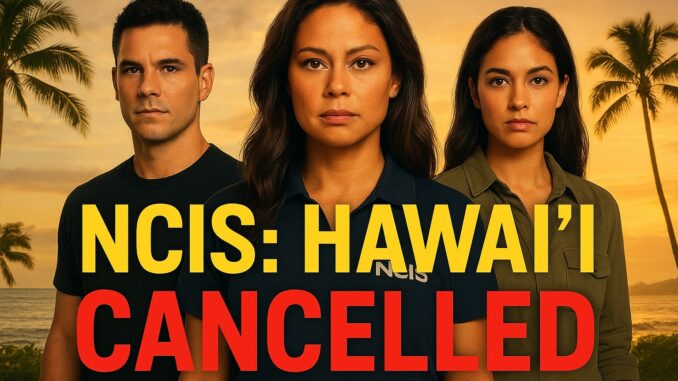
CBS shocked fans when it announced the cancellation of NCIS: Hawai’i after its third season. Despite being part of one of television’s most successful franchises, the show faced an abrupt ending that left viewers asking: Why? In this article, we’ll dive deep into the reasons behind the decision, the impact on the cast and crew, fan reactions, and what this means for the NCIS universe moving forward.
The NCIS Legacy: Why Hawai’i Was So Special
The NCIS franchise is no stranger to success. With NCIS, NCIS: Los Angeles, and NCIS: New Orleans, each spin-off carved its own identity. But NCIS: Hawai’i stood out for several reasons:
-
It was the first NCIS series led by a female Special Agent in Charge.
-
It highlighted diverse cultural perspectives, showcasing Hawaiian traditions.
-
Its setting gave fans a refreshing change of scenery from the typical crime procedural.
Despite these strengths, its run was unexpectedly short-lived.
CBS’s Sudden Decision: Why Cancel a Beloved Show?
The question that lingers is why would CBS end a show that still had a loyal fanbase? Multiple factors played a role in the decision:
Ratings Decline
Even though NCIS: Hawai’i started strong, ratings slowly dipped during its second and third seasons. Networks often prioritize numbers, and CBS wasn’t satisfied with the performance compared to other shows in the lineup.
High Production Costs
Filming in Hawaii was expensive. The picturesque landscapes added beauty, but the cost of maintaining production there was significantly higher than shooting in mainland studios.
Scheduling Conflicts
With CBS balancing multiple franchises, including new spinoffs and reboots, something had to give. Unfortunately, NCIS: Hawai’i didn’t make the cut.
Fan Reactions: Outrage and Disappointment
When news of the cancellation broke, social media exploded with frustration. Fans rallied on Twitter (now X), Instagram, and Reddit, demanding CBS reconsider. Hashtags like #SaveNCISHawaii and #BringItBackCBS began trending.
Some even launched petitions, hoping streaming platforms like Paramount+ might rescue the series.
The Cast’s Emotional Farewell
The cast wasn’t just acting; they had become a family. Vanessa Lachey, who played Special Agent Jane Tennant, shared heartfelt messages with fans after the announcement. Many cast members expressed gratitude for the opportunity but admitted they were heartbroken by the sudden ending.
How the Series Ended: Did Fans Get Closure?
Unfortunately, the abrupt cancellation meant writers didn’t get the chance to craft a proper series finale. While Season 3 wrapped up a few plotlines, many questions remained unanswered:
-
What was next for Jane Tennant’s leadership journey?
-
Would team relationships evolve further?
-
What long-term arcs were left hanging?
The lack of closure frustrated fans who invested years into the show.
Comparing NCIS: Hawai’i to Other Spin-Offs
It’s important to note that not every NCIS spinoff has the same lifespan.
-
NCIS: Los Angeles lasted 14 seasons.
-
NCIS: New Orleans ran for 7.
-
NCIS: Hawai’i barely reached 3.
This drastic difference raises eyebrows. Clearly, CBS saw other spinoffs as stronger long-term investments.
Industry Trends: Why Crime Dramas Are Struggling
The television landscape is changing. Viewers are moving toward streaming platforms, binging shows on-demand instead of sticking to weekly network schedules. Procedural dramas like NCIS: Hawai’i sometimes struggle to keep pace with shifting trends.
Could Paramount+ Revive the Series?
With Paramount+ expanding its content, fans wonder if the streaming service could revive NCIS: Hawai’i. While nothing has been confirmed, similar moves have happened in the past. Shows like Lucifer and Brooklyn Nine-Nine were saved by fan campaigns.
The Future of the NCIS Franchise
Despite this setback, the NCIS universe isn’t slowing down. NCIS (the original) continues to thrive, and CBS has launched new projects, including NCIS: Sydney. The franchise has proven it can evolve, but fans will always remember the unique contribution Hawai’i brought to the table.
Why NCIS: Hawai’i Deserved More Time
Some argue CBS didn’t give the series enough room to grow. It was groundbreaking in representation and storytelling. Canceling it so soon felt premature, especially when other spin-offs were given years to find their footing.
Lessons CBS Might Have Learned
-
Representation matters—viewers loved seeing diversity on-screen.
-
Fans crave closure—ending abruptly risks losing trust.
-
Location costs should be balanced with storytelling value.
Behind-the-Scenes Struggles
Insiders suggest there were also creative differences between CBS executives and the show’s writers. While not confirmed, such conflicts often play a role in network decisions.

The Emotional Connection Fans Built
More than just a crime drama, NCIS: Hawai’i offered heartwarming team dynamics, cultural exploration, and breathtaking visuals. Fans weren’t just watching a show—they were connecting with characters they saw as family.
Final Thoughts on NCIS: Hawai’i’s Cancellation
The cancellation of NCIS: Hawai’i highlights the brutal reality of television: no matter how beloved, shows live and die by ratings, budgets, and executive decisions. While fans mourn its abrupt ending, the series left behind a legacy of representation, stunning storytelling, and unforgettable characters.
Conclusion
CBS’s decision to cancel NCIS: Hawai’i after three seasons was abrupt, heartbreaking, and, to many, unfair. While the show may be gone, its impact lives on. It broke barriers, celebrated diversity, and added a fresh flavor to the NCIS universe. Whether it ever finds new life on a streaming service or remains a beloved memory, one thing is certain: NCIS: Hawai’i deserved better.
